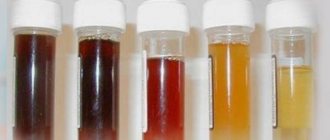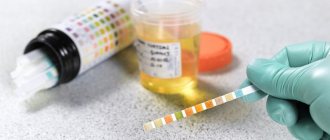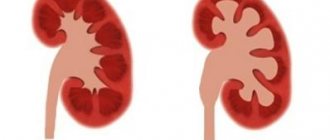Many parents are frightened when their child, who is not yet one year old, produces sticky urine from the body. More experienced people take this fact quite calmly. Often such urine is a signal that significant complications have appeared in the body.
You should not be alarmed prematurely, because there are various reasons. First, you should take a urine sample for a general analysis and visit a doctor. If glucose is detected in the urine, the urine must be taken again. The worst case scenario would be if the presence of sugar is confirmed. This is a sign that diabetes is starting.
Causes of sticky urine in women and men
Sugar in biological fluid gives it stickiness. With a normal level, glucose may be present in urine in such small quantities that even tests carried out in the laboratory do not recognize its presence. When deciphering, the laboratory assistant puts a dash in the corresponding column. But when glucose is detected, you should not be alarmed. You must first deal with the root causes:
- False indicators . In young patients, this happens when antibiotics or vitamin C are prescribed. In addition, before taking tests, it is recommended to exclude sweets from the diet. A repeat analysis will prove that there is no glucose in the urine.
- Diabetes . In such a situation, the sugar level rises first in the blood, and then in the urine. And if the presence of sugar is detected in the urine again, the doctor will prescribe a blood test. If the results of this study are normal, they begin to look for the cause in other places.
- Kidney failure , pathological abnormalities occurring in the kidneys.
- Various liver diseases.
- Glucosuria of an emotional nature . Pathology can occur after stressful situations and severe tension. This type is most often found in pregnant women.
Diagnostics
As it becomes clear, it is unequivocal, only on the basis of the appearance of such a symptom, it is impossible to find out the exact cause. Therefore, if sticky urine appears in adults and children, it is imperative to visit a medical facility.
- Blood and urine for sugar.
- General urine analysis.
- General blood analysis.
- Urine culture tank to identify the pathogen and sensitivity to antibiotics.
It is necessary to visit any specialist from the list: endocrinologist, therapist, urologist, pediatrician.
It should be remembered that changes in urine parameters and characteristics are considered an unfavorable symptom that cannot be ignored.
Normal level of sugar in urine
When a person does not experience problems with his own health, all organs work harmoniously, the sugar level in the urine will be 0.8 mmol/l. If this level is elevated and amounts to three percent or more, malfunctions in the functioning of the tubules of the paired organ appear. Because of this, glucose is practically not absorbed from the urine, and when analyzed, the sugar level in the biological fluid will be high. This can be understood by the fact that the urine begins to become sticky.
What symptoms are possible with glucosuria?
In its normal state, biological fluid contains water and other components. During evaporation, impurities in the urine will leave a stain that is slightly sticky to the touch until the substance has completely evaporated.
When dried urine remains sticky and contains crystals, it contains components of a pathological nature. You can change the consistency of urine secreted by the human body with certain foods - garlic, asparagus, cabbage and others.
It happens that changes in urine confirm developing diseases:
- infection of the genitourinary organs by harmful microorganisms;
- metabolic abnormalities;
- dehydration, poisoning.
If urine is cloudy in color and foams, it means that the level of protein and bile in the body has increased. This phenomenon is inherent in nephrotic syndrome, a complex pathology in which the filtration capabilities of a paired organ are affected by a virus, tumors, or diabetes.
When to contact a gynecologist?
Yellow, odorless discharge can be normal or pathological. Their number may increase before and after menstrual days, during ovulation. In this case, the color of the mucus can change from light yellow to creamy yellow. This must be remembered.
When leucorrhoea is the physiological norm, it has a uniform consistency and there are no lumps. In all other cases, especially when a woman has yellow discharge with an odor, you need to see a gynecologist.
Remember the symptoms that should make you see a specialist:
- change in the color and nature of vaginal discharge (their color has become white, deep yellow, brown, with a greenish tint, the consistency is thick, watery or cheesy);
- the appearance of an unpleasant odor (sour, fishy, acetone, etc.);
- menstrual irregularities (absence of menstruation, duration of menstruation less than two or more than seven days, scanty or very heavy discharge of blood);
- uterine bleeding;
- pain in the lower abdomen and lower back;
- itching of the genitals;
- pain in the mammary glands, discharge from the nipples (but the woman is not pregnant or breastfeeding);
- discomfort during or after sexual intercourse;
- lack of sexual desire for a partner (may be a sign of hormonal imbalance);
- pronounced PMS;
- intermenstrual bleeding of any intensity;
- frequent painful urination;
- urinary incontinence;
- unsuccessful attempts to become pregnant within a year or more of regular sexual activity without contraception.
In addition, if a woman plans to conceive a child, it is necessary to undergo an examination by a gynecologist. This is due to the fact that many diseases of the reproductive system occur without obvious symptoms. And it is important to undergo treatment before pregnancy.
And if a woman has a yellowish discharge with a smell, and she wants to get pregnant, all the more so she must first get tested, undergo drug therapy and make sure of its effectiveness (by taking the tests again a month after finishing taking the medications).
Possible diseases that contribute to the release of sticky urine in humans
Most often, glucose levels increase for the following reasons:
Diabetes
Excess sugar content gives the biofluid viscosity, and this most often happens during diabetes. Glucose levels can increase in people of different genders and age groups. It was noted that for a long period additional symptoms did not bother.
For this reason, you must always monitor your own health. When a person’s weight begins to change, he constantly feels thirsty, wounds take a long time to heal, resistance to physical stress disappears, you need to consult an endocrinologist who will prescribe a urine sample for a general analysis. In particularly severe cases, loss of consciousness may occur.
Kidney diseases
The main symptom of this pathology is swelling. When it is accompanied by poor appetite, general weakness, changes in pressure in the arteries, pain in the lumbar region, then the likelihood of diseases of the paired organ arises.
Kidney problems also arise if diabetes progresses in the body. Severe complications can only be prevented by regular examinations. liver diseases.
With an increased level of sugar in biological fluid, a person may experience certain symptoms in the form of nausea, belching, a specific and not entirely pleasant odor of sweat, yellowish color of the skin on the face, dark urine, diarrhea and changes in the color of stool.
Other diseases
Deviations from normal sugar levels can occur in other diseases. These include:
- acute pancreatitis;
- infectious meningitis;
- brain oncology;
- concussion or stroke.
Other reasons
- Diseases and pathologies of the thyroid gland.
- Injuries and pathologies of the pancreas.
- Injuries, head tumors (including traumatic brain injury).
- Kidney diseases of an inflammatory nature (nephritis, pyelonephritis, nephrosis).
- Long-term intoxication of the body (fever, chemical poisoning, etc.).
- Pathologies and tumors of the adrenal glands.
- Liver diseases.
- Hormonal imbalance.
There are several situations that are difficult to attribute to pathology or pure physiology. In some cases, sticky urine appears in people at the moment of a strong emotional outburst, no matter whether the event is joyful or sad. Strong physical activity, more often in men, also contributes to the appearance of unusual urine: sticky, dark or cloudy.
The development of a latent infection of the urinary organs, often of a bacterial nature, can contribute to the release of sticky urine.
In addition, urine may become sticky after consuming the following substances:
- In children: after a large number of sweets, sweet carbonated drinks, fatty foods.
- In adults: alcohol abuse, fatty foods, large amounts of strong coffee, taking medications (aspirin, hay, antipyrine, etc.).
Diagnostic measures
If flakes, deviations in color and consistency are found in the urine, you should urgently submit it for laboratory testing.
To do this, you need to collect a morning sample of urine. If diabetes is suspected, then the daily norm of biological fluid will be required for analysis. The research will not take much time and does not require special preparation.
For collection you will need a small container (in the case of daily urine, a three-liter jar). Containers for biological material must be sterile.
As a supplement, a blood test is prescribed. A characteristic sign of diabetes is a low level of glucose in the blood when it enters the urine. If there are additional symptoms, the doctor will prescribe an examination of the liver or a paired organ using an ultrasound machine.
How to treat?
The recovery process, in which urine returns to normal, involves dietary nutrition and therapeutic treatment, in accordance with the consultation of a specialist.
The more sugar there is in the blood, the higher the risk that it will appear in urine. For this reason, a special diet will not be a hindrance to anyone. When diabetes is diagnosed, special nutrition becomes a vital necessity.
Therapeutic treatment is aimed at lowering blood sugar levels. At the same time, it is necessary to reduce the amount of fluid consumed in order to reduce the leaching of sugar from the body.
If the pancreas cannot produce insulin, it will have to be administered intramuscularly. When hormone production is low, the doctor prescribes pills that stimulate this process. In addition, it is recommended to organize continuous monitoring of blood glucose levels.
Treatment
Since discharge with an unpleasant odor is always a symptom of an infectious or non-infectious disease, you can begin drug treatment only after visiting a doctor and finding out in the laboratory which medicine will be most effective.
Most often used for treatment:
- For thrush, suppositories, vaginal ointments and tablets are used that restore normal microflora.
- For vaginosis, antibiotics are prescribed that kill pathogenic microflora and treatment is completed by restoring normal microflora with the help of probiotics.
- To treat STDs, intramuscular injections and medications in the form of tablets, ointments and suppositories are used.
- For erosions and ectopia of the cervix, cauterization is common, which allows you to eliminate the problem for a long time.
Folk remedies
Tea made from blueberry leaves has proven itself to be excellent. You need to pour two to three tablespoons of raw materials into a thermos and pour boiling water (one liter). You should insist for at least four hours. You can drink the decoction at any time; sugar and other sweets are not required.
The herb stevia will also help with this problem. It is taken in small quantities, brewed with boiled water, and drunk instead of tea.
Cinnamon with fermented baked milk helps reduce glucose levels. Even diabetics can take this product without any problems, because the effect will only be positive.
You can also soak the beans overnight and then eat them raw. It will perfectly lower blood sugar and eliminate symptoms.
Possible consequences and complications
Having determined and examined the indicators of urine tests, you should immediately perform a diagnosis that will help establish the cause and begin therapeutic treatment. If glucose is detected in biological fluid once, then there is nothing wrong with it. But when a daily urine sample indicates deviations of a permanent nature, you should be wary of this.
In pregnant women, if the level of sugar and protein constantly changes, there may be a danger not only for the mother’s body, but also for the developing fetus.
The main problem with elevated sugar levels is the development of diabetes. Its amount in urine in this case exceeds 12 mmol per liter. Diabetes most often occurs from the abuse of fatty and spicy foods, alcoholic beverages, and smoking.










